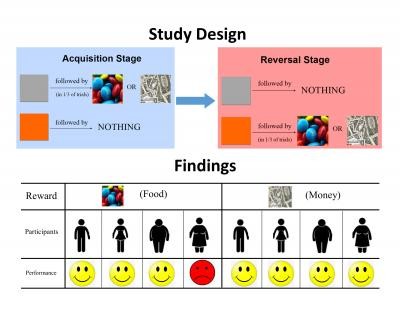Food Rewards Impair Obese Women's Learning Ability

Food impairs learning in obese women, according to a new study.
Researchers at Yale University found that obese women are less able to identify cues that predict food rewards. However, they were equally as capable when identifying cues that predict monetary rewards.
Researchers said that the latest findings could lead to behavioral interventions that could help treat obesity.
"Instead of focusing on reactions to the food itself, such interventions could focus on modifying the way in which obese individuals learn about the environment and about cues predicting food rewards," lead author Ifat Levy, assistant professor of comparative medicine and neurobiology at Yale School of Medicine, said in a news release.
The latest study involved 133 normal-weight and obese men and women. Participants were tested on their ability to learn associations between cues and rewards using images on a computer screen.
In the test, participants saw two colored squares. One color was sometimes followed by an image of a reward, and another color was never followed by a reward. Later during the test, the colors switched, and the second color was followed by a reward.
Participants were asked to show on a scale from one to nine how likely they though a reward image would appear after they were presented with each color.
Half of the participants were shown food rewards (chocolate, cookies), and the others were shown money. Participants were told that they would receive all the rewards they saw at the end of the experiment.
The findings revealed that obese women who performed the test with food rewards performed significantly worse on the test. Researchers explain that obese women rated both color squares as highly predictive of a food reward.
In contrast, obese women who performed the test with money rewards were scored just as well as other participants.
Researchers said the latest findings suggest that exposure to food impairs learning and modifying cue-reward associations in obese women. However, the study did not find the same association with men.
"What we observed is not a learning impairment, but rather a food-specific impairment present only in obese female participants," Levy concluded.
The findings are published in the journal Current Biology.
Jul 16, 2014 03:51 PM EDT





